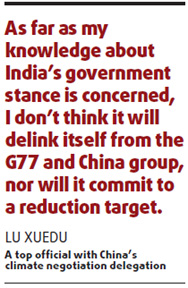China Perspective
'India mulling greenhouse emissions change of heart'
By Li Jing (China Daily)
Updated: 2009-10-20 09:45
India's environment minister, Jairam Ramesh, has proposed to the country's prime minister that New Delhi commits to reduce greenhouse gases without insisting on the transfer of finance and technology from rich countries, The Times of India reported yesterday.
If accepted, the idea could put pressure on developing nations and lead to uncertainty, experts warned.
In a letter to Indian Prime Minister Manmohan Singh, Ramesh is said to have suggested that the country "junk the Kyoto Protocol and delink itself from G77, the 131-member bloc of developing nations", a radical shift away from the position on climate negotiations held by India since 1990, the newspaper said.
Chinese officials and experts pointed out that the proposed policy shift, if adopted by the Indian government, would create more uncertainty in international climate talks.
"India has been one of the leading members of the G77 in previous climate change negotiations," said Lu Xuedu, a top official with China's climate negotiation delegation.
"As far as my knowledge about India's government stance is concerned, I don't think it will delink itself from the G77 and China group, nor will it commit to a reduction target," Lu told China Daily, calling the report a possible "misrepresentation".
"I don't think there would be a major change on India's stance before Copenhagen," he said.
Yang Fuqiang, director of the global climate change solutions program at WWF, said that if the proposal were to be accepted, India's leaving the G77-plus-China bloc would mean "a huge blow" to developing countries.
"I can't see any reason that India should walk away from G77. There would be no benefit for it to do so," Yang said.
Negotiators from developed countries and emerging nations have been wrestling with whether to extend the Kyoto Protocol into a second commitment period from 2013, amend the pact, or create a new one, a step many developing states resist.
The United Nations has set a December deadline for a deal, to be agreed at Copenhagen.
Kyoto obliges rich countries to make quantified commitments to cut emissions of greenhouse gases that stoke global warming, while developing countries do not have to assume quantified emissions targets.

In his letter to the prime minister, Ramesh also listed possible advantages of changing India's position, such as a permanent seat on the UN Security Council.
But the proposal is fundamentally different from official voices from New Delhi, such as that from India's special climate envoy, Shyam Saran.
In the latest round of UN climate talks in Bangkok earlier this month, India stood firmly with other developing countries, criticizing the push for a new treaty supported by the US and European Union.
"There's a concerted effort to put the Kyoto Protocol aside and to say we need a new instrument This is clearly not acceptable to India, because it hits at the very heart of the UN Framework Convention on Climate Change," Saran said.
Many countries have been unwilling to commit to cuts without first knowing the position of the US, where legislators are unlikely to pass laws governing a national emissions cap-and-trade system before next year.
Reuters contributed to the story










